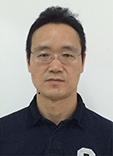Invited Speaker

Dr. Mingjie Chen
Distinguished professorCollege of Life Sciences, Xinyang Normal University, Xinyang, Henan, China
Speech Title: The advance in tea cuticle research
Abstract: With global climate changes, it is projected that the frequency and strength of extreme weathers, such as heat wave, freezing temperature, and drought, will raising. Environmental stresses not only cause great losses in crop productivity but also degrade food quality. Breeding for resilient new germplasms is an effective strategy to cope with climate changes. Abiotic stress tolerance of plants is a complex trait involving modifications at many levels. Plant cuticle is the interface between plants and their surrounding environment, it reduces non-stomatal water loss, protects plants from ultraviolet radiation, minimizes pollutant retention on leaf surfaces, defends against bacterial and fungal pathogens, participates in plant-insect interaction, regulates pollen-pistil interaction, and prevents organ fusion. These diverse functions are realized through the physical and chemical properties of cuticular waxes. In this talk, I will present our recent research progress in tea cuticle, including: how wax changes with leaf development, how drought stress modify cuticle, what are the structure-function relationships of cuticle, and how to measure the cuticular transpiration from different leaf surfaces and subcuticular compartments etc.
Biography: Mingjie Chen is a distinguished professor in College of Life Sciences, Xinyang Normal University since 2020. He earned his B.S. degree in Biology from Henan Normal University in 1987, M.S. degree in Microbiology from Wuhan University in 1994, and Ph.D. degree in Molecular Genetics from Shanghai Institute of Plant Physiology and Ecology in 2006. He was a visiting scholar to Hong Kong University of Science and Technology in 2002. Then he went to US and did his postdoctoral research in University of Minnesota and University of Missouri. In 2015, he moved back China and got a faculty position in Fujian Agriculture and Forestry University. Starting from FAFU, Dr. Chen shifted his research interests from model plants to horticultural crops such as tea and papaya. He is interested to develop new technologies and methods to study important questions in tea. He applied “–omics” technologies to explore the chemical base underlying tea quality, and volatile metabolism during tea making. He extensively studied the structure-function relationships of plant cuticle and their associations with plant drought stress. From these research he has produced more than 40 papers in reputed journals.
